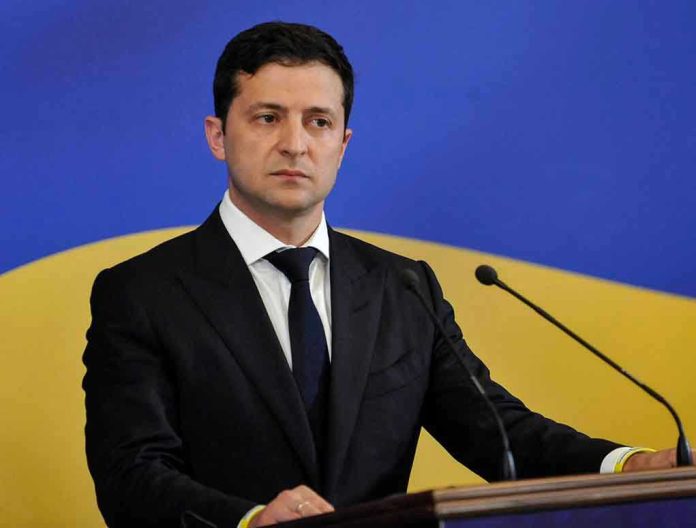
As Ukraine’s streets pulse with protest, the ink on a controversial anti-corruption bill signed by President Zelensky still dries, raising eyebrows and questions worldwide.
At a Glance
- Ukraine’s parliament passed a law curtailing the independence of key anti-corruption agencies.
- The law subordinates NABU and SAPO to the Prosecutor General’s Office.
- Protests erupted nationwide, with critics calling it a return to authoritarian practices.
- The controversy threatens Ukraine’s EU integration prospects.
Ukraine’s Anti-Corruption Struggles
In a move that sparked outrage, Ukraine’s Verkhovna Rada passed a law that alters the landscape of its anti-corruption efforts. This law, signed by President Zelensky, shifts the independence of NABU and SAPO under the watchful eye of the Prosecutor General’s Office. Once beacons of impartiality, these agencies now find themselves shackled by a new, controversial directive. The law passed quietly in the dead of night, but the public response was anything but quiet.
The streets of Kyiv and other Ukrainian cities have become the stage for a series of protests. Demonstrators are voicing their fears that the law represents a significant rollback of the post-EuroMaidan reforms. Critics argue this move could stifle ongoing corruption investigations, especially those targeting political elites. The ink had barely dried before the protests began, showing the deep-seated public dissatisfaction with the government’s decision.
The Stakeholders and Their Stakes
The passage of this law has placed several stakeholders in the spotlight. President Zelensky, who signed the law, faces accusations of consolidating power to protect political allies. The Verkhovna Rada’s majority, which supported the bill, finds itself at odds with opposition lawmakers and protestors who demand a veto. Meanwhile, NABU and SAPO, the agencies directly affected, issued statements condemning the bill, warning it would dismantle years of anti-corruption progress.
Outside Ukraine, the European Union and the international community have been vocal in their criticism. They see the law as a step back from the EU-aligned reforms Ukraine has committed to. This international pressure highlights the geopolitical ramifications of the legislation, which could affect Ukraine’s future relations with Western allies and its aspirations for EU integration.
The Domino Effect of the New Legislation
The immediate impact of the law is the loss of autonomy for NABU and SAPO, which now operate under the Prosecutor General’s jurisdiction. This change could halt or manipulate investigations into corruption, particularly those involving high-profile figures. The long-term implications are equally concerning. The erosion of anti-corruption reforms threatens to undermine democratic institutions and public trust in governance.
Ukraine’s economy might also feel the tremors of this legislative shift. Foreign investors may become wary of engaging with a country perceived as unstable and plagued by corruption. Socially, the public unrest signals a dissatisfaction that could lead to further political instability, as citizens demand transparency and accountability from their leaders.
The Road Ahead
Experts in anti-corruption emphasize the dangerous precedent set by subordinating independent agencies to political control. This move, they argue, weakens the checks and balances necessary for a functioning democracy. Academic voices echo these concerns, likening the situation to pre-EuroMaidan days when political interference was rampant.
While some government supporters claim that the law streamlines investigations, critics view it as a tool for political manipulation. The European Union’s Enlargement Commissioner has publicly condemned the legislation, underscoring the risk it poses to Ukraine’s reform path. As Ukraine faces this pivotal moment, the international community watches closely, hopeful that the country will find a way to preserve its democratic ideals.
Sources:
Kyiv Independent, July 22, 2025
Eurointegration, July 22, 2025














